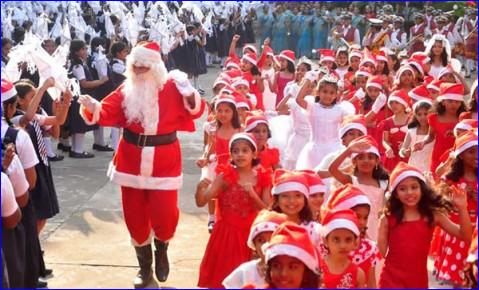


Christmas is celebrated by Indians the world over not just as the more visible manifestation of the Hollywood, mass-produced version, but also as an ancient festival with indigenous Indian traditions.
Christianity was brought to India in the beginning of the last millennium by St. Thomas the Apostle in the middle of the First Century, 20 years after the death of Christ, notes Rev. Columba Stewart, executive director of the Hill Museum & Manuscript Library (HMML) and professor of theology at Saint John's School of Theology and Seminary in Collegeville, Minnesota.
That is corroborated by evidence of the Roman trading post in Kerala, proof that Christianity could easily have been part of the imports along with the trade missions that frequented the post, said Rev. Stewart who is described by the Guggenheim Foundation which awarded him the 2016 fellowship, as a modern Benedictine monk recognized as an expert on the history of early Christianity and monasticism.
The original Christian churches in Kerala conducted their liturgy in the Syriac language and those churches continue the traditions, Rev. Stewart told News India Times. (Syriac language is a dialect of the Aramaic language that was used by Jesus.) When the Portuguese came to India in the 15th Century, they were surprised not just by the existence of Christianity but also by the different practices dissimilar to the Catholic tradition, he noted.
The Portuguese in their zeal, collected all the manuscripts they could find and revised them and burned the old indigenous Syriac manuscripts, said Stewart, who has developed HMML's extensive manuscript digitization initiatives in historic Christian and Muslim communities in India, the Middle East, Eastern Europe, and Africa. Only a handful of manuscripts of the period before the Portuguese arrived, survived the Portuguese destruction, and those are mostly the ones taken from the Middle East and not indigenous to Kerala, he said.
He called the attempt to change an ancient tradition of India, a "Colonial cultural imposition." in his interview with News India Times. The bright side of the equation is that the modern history of Christianity in India is trying to recover more of the authentic pre-Portuguese practices and to have a more independent church.
Most of the rest of Christianity around India is a product of later missionaries, the Dutch, the English and others. "Kerala has the truly indigenous, ancient Christianity. So, Christianity in Kerala is older than here or in Germany, France, and England (Western Europe), which became Christian much later," Rev. Stewart said. Which makes Christian festivals, including Christmas very interesting and different from Christianity elsewhere, more authentic, he said. "There is an incorporation of traditional Indian elements like professional Hindu drummers, oil lamps in the church, and the musical traditions," he said.
Also, not to be ignored, the caste system. "Yes, they have their Christian counterpart to the (caste) system as well as other historical sub-groupings that function like caste for marriage etc.," Rev. Stewart acknowledged.
Today, Christmas has become a very secular time of giving and celebrating, as well as being about the birth of Jesus Christ. Even in a country like Japan which has an extremely tiny Christian population, it is a big deal, Rev. Stewart pointed out.
However, "The secular celebration has become very distant from the religious," he said. "Certainly, in Kerala people are very serious about preserving the authentic aspects of Christmas," considering the fact that Christianity is very strong in a state which has the highest percentage of Christians in India. "The religious aspect (of Christmas) is very critical," there, he observed. Reverse Missionaries
With the dwindling number of priests in the Western Hemisphere, as Christianity becomes progressively secularized, ironically, there's a rising trend of bringing priests from India and Africa to head churches in the U.S.
"Many priests from India are now working in U.S. churches. The same is true of Africa where the practice of Catholicism is very high," Rev. Stewart noted. "In a sense, it is 'reverse missionaries.'" The Church is finding ways to keep traditions alive, "And if we don't have priests -- we get them from somewhere else."

or register to post a comment.